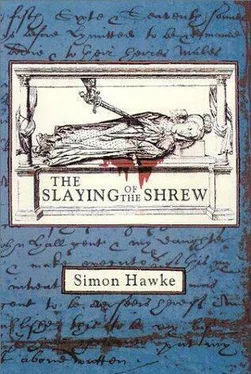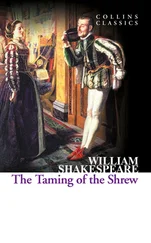Simon Hawke - The Slaying Of The Shrew
Здесь есть возможность читать онлайн «Simon Hawke - The Slaying Of The Shrew» весь текст электронной книги совершенно бесплатно (целиком полную версию без сокращений). В некоторых случаях можно слушать аудио, скачать через торрент в формате fb2 и присутствует краткое содержание. Жанр: Исторический детектив, на английском языке. Описание произведения, (предисловие) а так же отзывы посетителей доступны на портале библиотеки ЛибКат.
- Название:The Slaying Of The Shrew
- Автор:
- Жанр:
- Год:неизвестен
- ISBN:нет данных
- Рейтинг книги:5 / 5. Голосов: 1
-
Избранное:Добавить в избранное
- Отзывы:
-
Ваша оценка:
- 100
- 1
- 2
- 3
- 4
- 5
The Slaying Of The Shrew: краткое содержание, описание и аннотация
Предлагаем к чтению аннотацию, описание, краткое содержание или предисловие (зависит от того, что написал сам автор книги «The Slaying Of The Shrew»). Если вы не нашли необходимую информацию о книге — напишите в комментариях, мы постараемся отыскать её.
The Slaying Of The Shrew — читать онлайн бесплатно полную книгу (весь текст) целиком
Ниже представлен текст книги, разбитый по страницам. Система сохранения места последней прочитанной страницы, позволяет с удобством читать онлайн бесплатно книгу «The Slaying Of The Shrew», без необходимости каждый раз заново искать на чём Вы остановились. Поставьте закладку, и сможете в любой момент перейти на страницу, на которой закончили чтение.
Интервал:
Закладка:
Until he knew more, Smythe could not eliminate any of them from consideration. Sir William had the best chance of uncovering any possible deception with a few inquiries at court, but until he could return, Smythe was on his own. The trouble was he did not know what, if anything, he could accomplish. He wished that Shakespeare would return from London soon, for the poet had a clever way of thinking through things and looking at situations from all sides that doubtless came from plotting out his plays. His mind was quite adept at doing that. However, as the day wore on towards evening and Shakespeare still did not return, Smythe could but observe the suspects from a distance and attempt to guess which, if any of them, had tried to kill him in the maze.
At the same time, he could not help but notice that Elizabeth kept right on avoiding him. At the funeral, she had wept openly and unashamedly, and was more demonstrative in her grief than anyone, even Blanche, who dabbed daintily at her eyes with a handkerchief and kept her gaze downcast. Elizabeth had been escorted by her father, who had left for London shortly thereafter, promising to send a carriage for her on the following day, for she had seemed much too distraught to travel. Since then, Smythe had not even seen her. He told himself that she had every reason to feel upset and had probably retired to one of the upstairs rooms. But something told him there was more to it than that.
Elizabeth simply did not seem herself, and some instinct told him there was more to it than grief over a murdered friend, however unlikely that may have seemed. He simply could not shake the feeling. He had learned to trust his instincts. Therefore, when he saw Elizabeth come furtively down the stairs that evening as the sun was going down and head outside, he followed her once more.
8
He was cold and wet and there was mud all over his clothing from helping the coachman wrestle with the wheel of the carriage in the pouring rain. The fool had been as reckless with his breakneck speed on the return trip as he had been going out to London, but this time, instead of worrying about a wreck, Shakespeare had urged him to go even faster.
Shortly after they set out, it began to rain and he had held on for dear life, gritting his teeth and trying to ignore the way the light carriage careened and bounced along the rutted road. He could think of nothing else but what Granny Meg had told him and he knew he had to get back to Middleton Manor as soon as humanly possible. And so, of course, they had a wreck.
The wheel had come off after the carriage had bounced up and come down particularly hard, and Shakespeare was very nearly thrown from the seat. He and the driver had both somehow managed to hang on as the carriage slewed to a stop, further damage prevented only by the fact that the road had completely turned to mud where a creek had overflowed its banks and washed across their way, thereby softening the surface. Fortunately, the wheel had not been damaged and together they were able to replace it, effecting a barely workable repair. However, that was not until they had sworn and shouted at each other and pretty much exhausted their entire repertoire of epithets, at which point the driver, exasperated to the point of sheer blind fury, had launched himself at Shakespeare and together they tumbled down into the mud, where they grappled and pummelled one another until the utter absurdity of their situation struck them and they had started laughing, which ended the fight and induced a spirit of mutual cooperation in the face of adversity.
“Come on, now, Ian, God blind you,” Shakespeare urged the coachman, from his seat beside him, “can you not go any faster?”
“Not unless you want that poxed wheel to come off again,” Ian replied. “Now sit still, damn you, and stop pestering me!”
“Tis growing dark,” said Shakespeare, with concern. “How much farther?”
“God!” Ian rolled his eyes. “Not far. Only a few miles. Have patience!”
“We wasted too much time back there.” “Well now, whose fault was that, eh?”
“You dissentious scoundrel! You dare suggest ‘twas mine? The reins were in your hands!”
“Aye, but you distracted me!”
“Odd’s blood, you were born distracted, you simpleton!”
“Sod off!”
“You bloody well sod off!”
“One more word and God be my judge, ‘tis walking back ye’ll be!”
The carriage lurched suddenly and skewed sharply to the left, coming down with a jarring impact and skidding to a halt as the hoses neighed and reared in protest.
“Oh, Hell’s spite! The poxed wheel’s come off again!” said Ian, throwing down the reins in disgust. “Now it looks like we shall both be walking.”
“The devil you say!” Shakespeare replied. “Unhitch the horses.” “What? And leave the carriage? Master Middleton would strip the hide straight off me if I was to abandon it.”
“I promise you, he will do much more than that if we are delayed much longer,” Shakespeare said. “Now unhitch them, damn you! We must reach Middleton Manor before nightfall!”
It had begun to rain and Smythe cursed himself for not having the foresight to bring along a cloak, as Elizabeth had. Unlike most of the guests at the estate, whose sense of fashion had demanded that they bring enough suits of clothing with them to change at least several times a day, he owned but one cloak, two doublets, two pair of breeches, two shirts, two pair of hose-both threadbare-and but one pair of shoes, which were well worn. On one hand, it made packing fairly simple. On the other, it meant that ruining one suit of clothes left him with only one to wear. There would have been no time to run and get his cloak, for he would have lost track of Elizabeth. Therefore, he was forced to go dressed as he was, which meant getting cold and wet as he pursued Elizabeth outside. However, mindful of what had happened the last time he had followed her, he hesitated only long enough to grab a rapier off the wall in the great hall, where it had been displayed along with its companion and a buckler. He was pleased to note that it was a good Sheffield blade, not ostentatious, but quite servicable.
He gave Elizabeth some leadway, so that she would not suspect that she was being followed. She had been furtive in her movements as she went outside, glancing around several times, as if to make certain no one saw her. Several times Smythe had to duck back out of sight in order to prevent her spotting him, but now she seemed far more intent upon her destination than upon making sure she was not followed. Once more, Smythe thought, she was going out alone at night, in a manner that was most suspicious. If she were not going to meet a man, then what else could she possibly be doing?
He had expected her to circle back around the house and head out towards the maze again, on the other side. Instead, she kept on going straight, away from the house and the fairgrounds, down a path leading towards the river. It struck him that she was taking the same path that the funeral procession had followed to the Middleton family vault.
It started raining harder as Elizabeth disappeared from sight, heading down the slope and towards the woods. Smythe gave her a moment’s lead, then ran across the open courtyard on the river side of the house, towards the path leading down into the trees. He could not see Elizabeth as he came running down the slope, following the pathway, but as he reached the trees, he caught a glimpse of her dark cloak, disappearing round a bend, into the woods. He paused to let her get a little more ahead of him, lest the sounds of his running footsteps give him away. He waited for a moment, catching his breath as he leaned back against a tree.
Читать дальшеИнтервал:
Закладка:
Похожие книги на «The Slaying Of The Shrew»
Представляем Вашему вниманию похожие книги на «The Slaying Of The Shrew» списком для выбора. Мы отобрали схожую по названию и смыслу литературу в надежде предоставить читателям больше вариантов отыскать новые, интересные, ещё непрочитанные произведения.
Обсуждение, отзывы о книге «The Slaying Of The Shrew» и просто собственные мнения читателей. Оставьте ваши комментарии, напишите, что Вы думаете о произведении, его смысле или главных героях. Укажите что конкретно понравилось, а что нет, и почему Вы так считаете.












